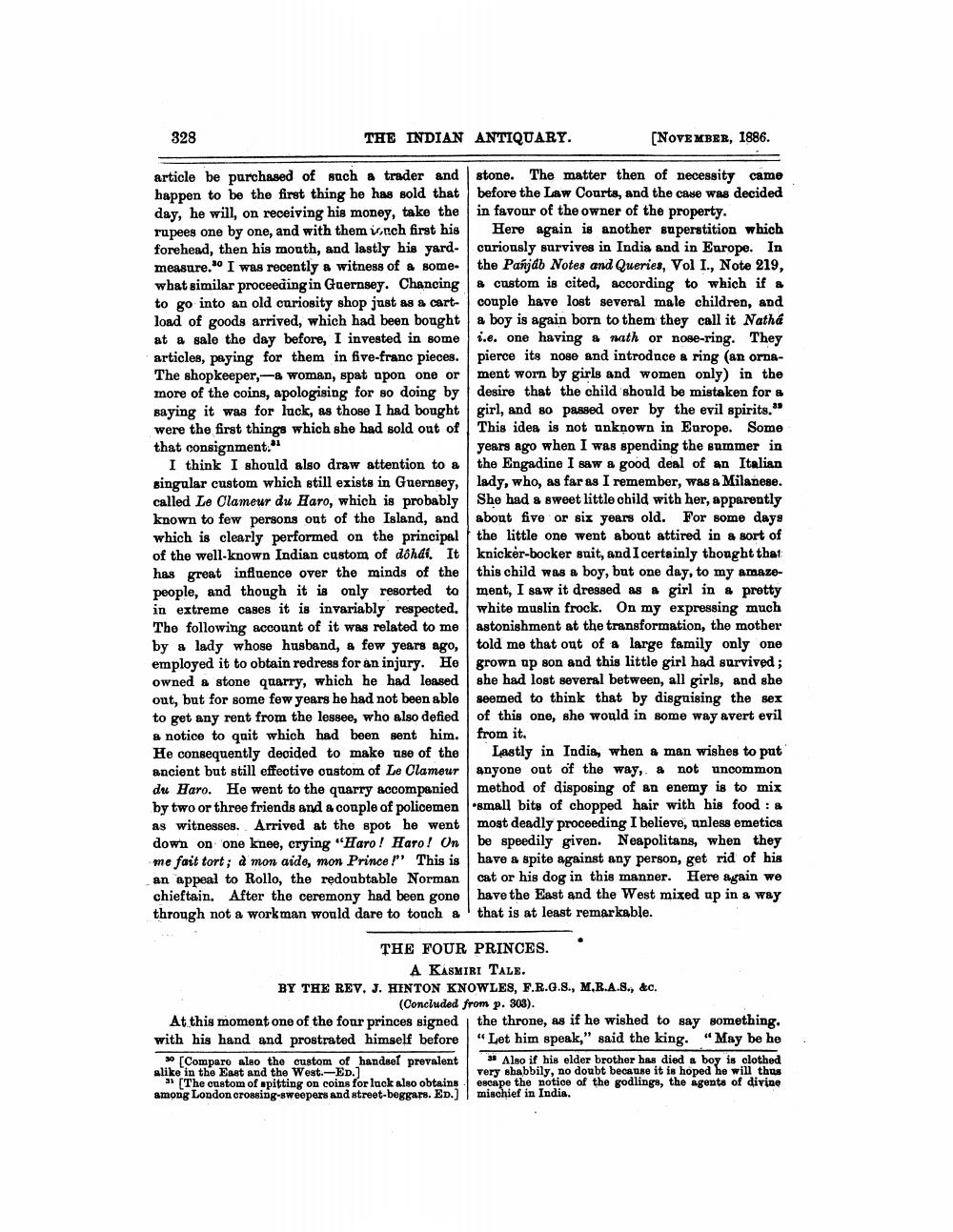________________
328
THE INDIAN ANTIQUARY.
article be purchased of such a trader and happen to be the first thing he has sold that day, he will, on receiving his money, take the rupees one by one, and with them inch first his forehead, then his mouth, and lastly his yardmeasure. I was recently a witness of a somewhat similar proceeding in Guernsey. Chancing to go into an old curiosity shop just as a cartload of goods arrived, which had been bought at a sale the day before, I invested in some articles, paying for them in five-franc pieces. The shopkeeper, a woman, spat upon one or more of the coins, apologising for so doing by saying it was for luck, as those I had bought were the first things which she had sold out of that consignment."
I think I should also draw attention to a singular custom which still exists in Guernsey, called Le Clameur du Haro, which is probably known to few persons out of the Island, and which is clearly performed on the principal of the well-known Indian custom of dôhdi. It has great influence over the minds of the people, and though it is only resorted to in extreme cases it is invariably respected. The following account of it was related to me by a lady whose husband, a few years ago, employed it to obtain redress for an injury. He owned a stone quarry, which he had leased out, but for some few years he had not been able to get any rent from the lessee, who also defied a notice to quit which had been sent him. He consequently decided to make use of the ancient but still effective custom of Le Clameur du Haro. He went to the quarry accompanied by two or three friends and a couple of policemen as witnesses. Arrived at the spot he went down on one knee, crying "Haro! Haro! On me fait tort; à mon aide, mon Prince !" This is an appeal to Rollo, the redoubtable Norman chieftain. After the ceremony had been gone through not a workman would dare to touch a
[NOVEMBER, 1886.
stone. The matter then of necessity came before the Law Courts, and the case was decided in favour of the owner of the property.
At this moment one of the four princes signed with his hand and prostrated himself before
30 [Compare also the custom of handsel prevalent alike in the East and the West.-ED.]
31 [The custom of spitting on coins for luck also obtains among London crossing-sweepers and street-beggars. ED.]
Here again is another superstition which curiously survives in India and in Europe. In the Panjab Notes and Queries, Vol I., Note 219, a custom is cited, according to which if a couple have lost several male children, and a boy is again born to them they call it Nathá i.e. one having a nath or nose-ring. They pierce its nose and introduce a ring (an ornament worn by girls and women only) in the desire that the child should be mistaken for a girl, and so passed over by the evil spirits." This idea is not unknown in Europe. Some years ago when I was spending the summer in the Engadine I saw a good deal of an Italian lady, who, as far as I remember, was a Milanese. She had a sweet little child with her, apparently about five or six years old. For some days the little one went about attired in a sort of knicker-bocker suit, and I certainly thought that this child was a boy, but one day, to my amazement, I saw it dressed as a girl in a pretty white muslin frock. On my expressing much astonishment at the transformation, the mother told me that out of a large family only one grown up son and this little girl had survived; she had lost several between, all girls, and she seemed to think that by disguising the sex of this one, she would in some way avert evil from it.
THE FOUR PRINCES. A KASMIRI TALE.
BY THE REV. J. HINTON KNOWLES, F.R.G.S., M.B.A.S., &c. (Concluded from p. 303).
Lastly in India, when a man wishes to put anyone out of the way, a not uncommon method of disposing of an enemy is to mix small bits of chopped hair with his food: a most deadly proceeding I believe, unless emetics be speedily given. Neapolitans, when they have a spite against any person, get rid of his cat or his dog in this manner. Here again we have the East and the West mixed up in a way that is at least remarkable.
the throne, as if he wished to say something. "Let him speak," said the king. "May be he
3 Also if his elder brother has died a boy is clothed very shabbily, no doubt because it is hoped he will thus escape the notice of the godlings, the agents of divine mischief in India.




